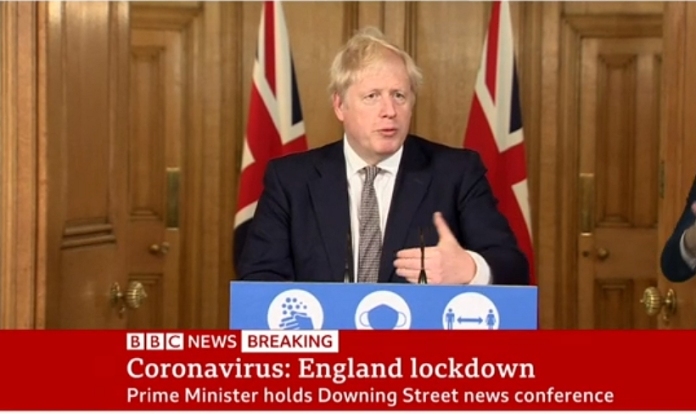Prime Minister Boris Johnson has announced a second national lockdown for England will start on Thursday after the country passed one million Covid-19 cases.
Non-essential shops and hospitality will have to close for four weeks on Thursday, but unlike the restrictions in the spring, schools, colleges and universities will be allowed to stay open.
Takeaways will be allowed to stay open but pubs, bars and restaurants will have to close. Essential shops will remain open so “there’s no need to stock up” the PM insisted, adding that workplaces should stay open where people cannot work from home.
What will change from Thursday?
- People will be told to stay at home except for specific reasons
- These include work which cannot be done from home, childcare or education, exercise outdoors, medical reasons, essential shopping, providing care for vulnerable people or for volunteering, and visiting members of your support bubble
- Meeting indoors or in private gardens will not be allowed, but individuals can meet one other person from another household outside in a public place
- Non-essential retail will close, but can remain open for click-and-collect delivery
- Pubs, bars, restaurants will have to close, but can still provide takeaway and delivery, excluding takeaway of alcohol
- Indoor and outdoor leisure facilities, such as gyms and swimming pools, will also close, along with entertainment venues and personal care facilities such as beauty salons
- Places of worship will close, unless they are being used for funerals, to broadcast acts of worship, individual prayer, formal childcare, or essential services such as blood donation or food banks
- Construction sites and manufacturing workplaces can remain open
- Weddings and civil partnership ceremonies will not be able to take place except in exceptional circumstances, and funerals will be limited to a maximum of 30 people
- Children will still be able to move between homes if their parents are separated
- Clinically vulnerable people will be asked to be “especially careful” but people will not be asked to resume shielding
- Overnight stays, staying in a second home, and holidays will not be allowed – including in the UK and abroad – although there are exceptions, such as work trips
- People will be told to avoid all non-essential travel by private or public transport
Support bubbles will still be allowed and children will be able to move homes if their parents are separated.
The PM says the government will not ask people to shield again “in the same way” as last time. It comes as documents suggested the UK was on course for a much higher death toll than during the first wave.
The lockdown is due to last until 2nd December, the Prime Minister said at a Downing Street news conference.
Takeaways will be allowed to stay open as pubs, bars and restaurants close and people are being told they can only meet one person from outside their household outdoors.
Mr Johnson, who chaired a cabinet meeting on Saturday afternoon, will make a statement to Parliament on Monday.
The UK recorded another 21,915 confirmed coronavirus cases on Saturday, bringing the total since the pandemic began to 1,011,660. Another 326 people were reported to have died within 28 days of a positive test.
The UK is the ninth country to reach the milestone of a million cases – after the US, India, Brazil, Russia, France, Spain, Argentina and Colombia.
But the true number of infections is expected to be higher due to a lack of widespread testing at the start of the pandemic.
Prof Neil Ferguson, whose modelling was crucial to the decision to impose the first lockdown, said keeping universities and schools open meant infections would decrease more slowly this time.
He said the new restrictions could reduce cases by anywhere between 20% and 80%, adding that he hoped larger groups of people would be able to gather by Christmas “if only for a few days”.
Mr Johnson had previously resisted pressure to introduce nationwide restrictions, saying they would be “disastrous” for the UK’s finances and opting instead for a three-tiered system targeting local areas in England.
Ahead of the news conference, school and university unions called for education institutions to be closed and for teaching to move online in another national lockdown.
The National Education Union said it would be “self-defeating” to ignore how schools helped to spread the virus.
And “the health and safety of the country is being put at risk” by the insistence on keeping in-person teaching on campuses, the University and College Union said.







